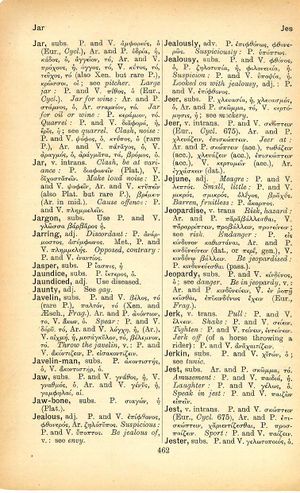jejune: Difference between revisions
From LSJ
αὐτόματοι δ' ἀγαθοὶ ἀγαθῶν ἐπὶ δαῖτας ἴασι → automatically do the noble go to the feasts of the noble
m (Text replacement - "}}]]" to "}}]]") |
m (Text replacement - "(|thumb)\n(\|link=)" to "$1$2") |
||
| Line 1: | Line 1: | ||
{{Woodhouse1 | {{Woodhouse1 | ||
|Text=[[File:woodhouse_462.jpg|thumb | |Text=[[File:woodhouse_462.jpg|thumb|link={{filepath:woodhouse_462.jpg}}]]'''adj.''' | ||
|link={{filepath:woodhouse_462.jpg}}]]'''adj.''' | |||
<b class="b2">Meagre</b>: P. and V. [[λεπτός]]. | <b class="b2">Meagre</b>: P. and V. [[λεπτός]]. | ||
<b class="b2">Small, little</b>: P. and V. [[μικρός]], [[σμικρός]], [[ὀλίγος]], [[βραχύς]]. | <b class="b2">Small, little</b>: P. and V. [[μικρός]], [[σμικρός]], [[ὀλίγος]], [[βραχύς]]. | ||
Revision as of 17:10, 18 May 2020
English > Greek (Woodhouse)
adj.
Meagre: P. and V. λεπτός. Small, little: P. and V. μικρός, σμικρός, ὀλίγος, βραχύς. Barren, fruitless: P. ἄκαρπος.
Latin > French (Gaffiot 2016)
jĕjūnē¹⁶ (jejunus), avec sécheresse, maigrement, sans développement : Cic. de Or. 1, 50 ; Or. 119 ; 123 ; Plin. Min. Ep. 1, 20, 20 ; Gell. 19, 3 || jejunius Cic. Fin. 3, 17 ; Att. 12, 21, 1.

